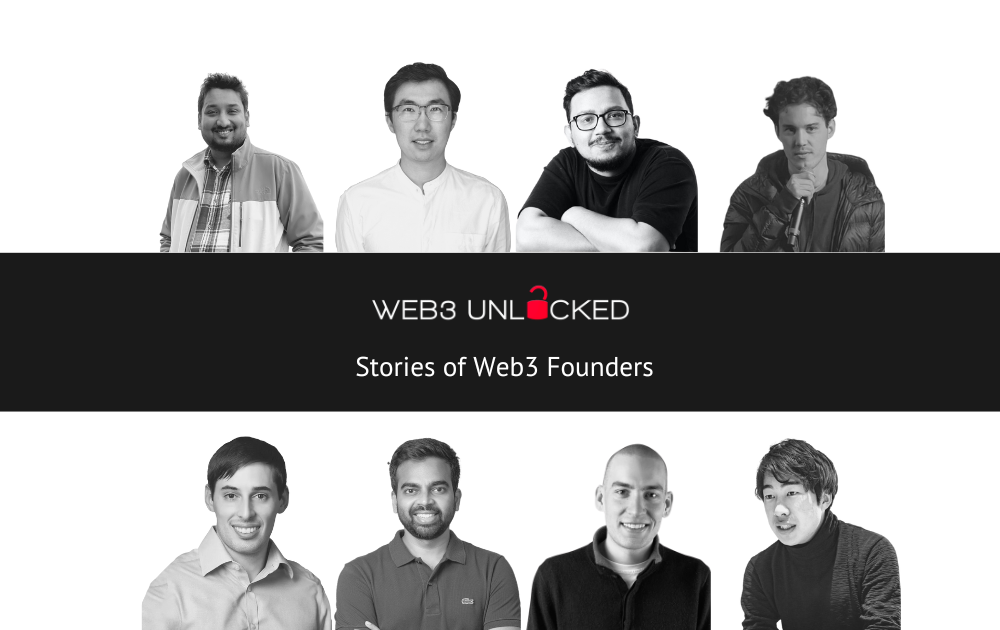Over the past year, I have spoken to founders from various Web3 projects interviewed on the Web3 Unlocked Podcast, be it Web3 gaming, protocols, or dApps. The common thread in all my conversations is this – Web3’s time is coming. We will inevitably cross 1 billion users., but the path is still being carved.
It is not going to be easy, and those who are looking to start their Web3 startups will have a lot of work ahead of them. There are certain principles that you will need to focus on to succeed. Based on my conversations in Web3 Unlocked, here are some key takeaways for Web3 founders from my discussions with other Web3 founders:
Community comes first
“Your community should be a part of your soul and your personality.” – Harsh Rajat, Founder of Push Protocol.
One of the biggest factors that set Web3 apart from Web 2.0 is the involvement of the community and its participation in projects. Most of our guests, including Lucas Vogelsang, co-founder of Centrifuge, expressed this sentiment and mentioned that building a Web3 product requires one to be comfortable working in an undefined space until something sticks. You must be open to collaboration because you can’t do it alone in Web3. The community doesn’t appreciate it, and neither does the ecosystem.
“Web2 product builders are building their products, finding their own users, doing their own marketing, and trying to establish their category. In Web3, this does not work; if everyone built everything themselves, product development would be very distracted.”
Web3 Tech is unpredictable, but the fundamentals need to be solid
Tech founders need to be prepared for what the technology may look like in two, five, or more years in the future.
Every founder may not have the foresight to see what the future of blockchain technology could look like, but it does not mean that you shouldn’t speculate. Matthew Gould, founder, and CEO of Unstoppable Domains, did this when his team prepared their pitch deck in the early days. He advises new founders to write their predictions of how the market will go to see whether they may prove right over time–signaling whether you are going in the right direction with your thinking or not.
“I was very clear that if we want to build something, which stays three decades from now, it cannot be singular technology based. The core goal has always been mass adoption, so you need a full suite of these Web3 solutions. So we’ve been working on that relentlessly every single day.” – Sandeep Nailwal, co-founder of Polygon.
Raise your funding at the right time
As the founder of an early-stage Web3 startup, understanding the right time to raise funding may require effort. It’s made even more difficult considering we are in a bear market. However, as an investor, I must emphasize that it is not impossible to raise funding, even in the current industry dynamics. One thing to keep in mind is your product-market fit.
Chris Gonsalves, founder, and CEO of Community Gaming says:
“If you haven’t found product-market-fit yet, don’t give yourself too big of a shoe to fill; rather, bring in great investors who are happy with the valuation. Then, if you go to raise another round, it won’t be such a high bar.”
Another thing to have? Good timing. Though there may also be a factor of luck in this, a lot of it is in your numbers. Matthew advises striking when the iron is hot:
“Go out and get your fundraising when your numbers are looking good, not when you need it,” he adds.
Persevere, Persevere, Persevere!
Perseverance may be standard advice in any context. But it could not be truer for Web3 founders, especially in the current market (more about this later). It is inevitable that you will face downturns and that you will make mistakes.
What sets great founders apart is their ability to get back up and continue building. It is best to fail quickly, then learn from these mistakes and keep going.
“Hard work and perseverance are qualities you must have irrespective of whether you’re working in Web2 or Web3. But specifically for Web3, the most important thing is to set aside this whole concept you’re building for yourself and a few people around you. Long-term Web3 success is about losing power, not gaining power. You are not the center of attention.” – Nischal Shetty, founder of WazirX and Shardeum.
Of course, it is also important to realize when to change your direction if you have to. Web3 founders need to be more open-minded about what their products can be.
Web3 is all about uncertainty–sometimes things work, sometimes they don’t. So be okay with rebuilding your product if it doesn’t.
“If you’re comfortable with changing things up because you’re not heading in the right direction, then I think Web3 is great for you because you also get a lot of customer feedback.” – Matthew Gould.
Focus on one thing
As a new Web3 founder, getting distracted by the latest ideas and developments is easy. It’s easy to jump from one idea to the next. But this could also mean that you work long and hard for that perfect product-market fit, only for it to keep evading you.
Andrew Durgee, the Head of Republic Crypto, mentions that their company focused on building one thing at a time, “We stay hyperfocused. Businesses that try to chase too many shiny things spread themselves too thin and then collapse when markets shift.”
Jack Lu, the co-founder of Magic Eden, spoke of a similar experience, sharing that when you’re running fast and want to get a lot of adoption, sometimes the sexy and easy idea is to build a whole bunch of features at once. “Force yourself to focus, especially in the fog of war and the noise of crypto and Web3 Twitter. Force yourself to focus on doing one thing really, really, really well,” he says.
For instance, at one point, Magic Eden went through a critical period where they shopped no new features. All they did was clear up the tech deck and build better foundations for the product. Following this, they improved the site performance, reliability, speed, and latency. With this, user sentiment also improved drastically.
Focusing on that one thing will help you get your product-market fit early for the market. Miles Anthony, the founder of Decentral Games, recalled in his Web3Unlocked episode that working on economic incentives helped them make their product sustainable in the long term. Focusing on play-to-earn helped them increase organic user engagements.
Hire the right talent
It is no secret that talent is a massive problem in Web3- whether it be finding the right people or retaining them. And since Web3 is not for everyone, sometimes you must make tough decisions to let people go. For example, Sota Watanabe, the founder of Astar Network, mentions that he had to fire people a few times, and it was not easy :
“Great teams create great products; it is not about individuals. While my team handles most of the day-to-day work, I focus on long-term strategy and raising money.”
More interesting is why and how Sandeep decided that Polygon should become a talent magnet in the ecosystem – hiring the best from the world of Web2 and Web3:
“I asked myself why it is that Polygon is not able to get its due respect and premium status despite enabling so much mass adoption. The answer was that if we attract premium talent, then people will start giving it a premium status. Most of the time, when the talent is coming in, they are more interested in speaking to the founders and the founding team’s vision. I was very clear in communicating with whomsoever I was speaking to that we might have a high valuation, we are still a very small startup and have not done anything. The goal is to become the top three platform by impact.”
The benefit of building in a bear market
The crypto industry is a lucrative one, which means many jump on the train to share in the monetary gains without really helping to advance the technology forward. A bear market helps in clearing out the noise. As Nischal said, those who build in the bear market are really serious about their work, and so investors tend to see more good quality startups.
Republic mentioned on our podcast that they were built in a crypto winter, they can survive suppressed marts and thrive and grow in crypto summers, giving them a solid foundation.
“I love building in the bear market, even though it has made it harder for everyone to raise money and grow. I think good projects will easily make it and come out of this, with sustainable products like Uniswap.” – Lucas Vogelsang.
“In a bear, the tourists have left, and it’s only the hardcore believers who are left in the ecosystem.” – Jack Lu.
What We Can Look Forward To
Initiating and hosting Web3Unlocked has given me access to so many valuable insights from founders who have gone through different journeys in the Web3 ecosystem. For instance, during my conversation with Matthew, he pointed out that economic downturns are present right before a new technology is widely adopted. There was a similar downturn in the early 2000s before domestic internet usage exploded. Now, there are over five billion internet users–that’s over half the world’s population!
We are still some ways off from Web3 becoming adopted by over a billion users, but if anything, this current crypto winter suggests, it is that we are not far off. With more and more Web3 companies rising during the bear market, Web3 will become more accessible and user-friendly as we move on to the next stage of the crypto evolution.



